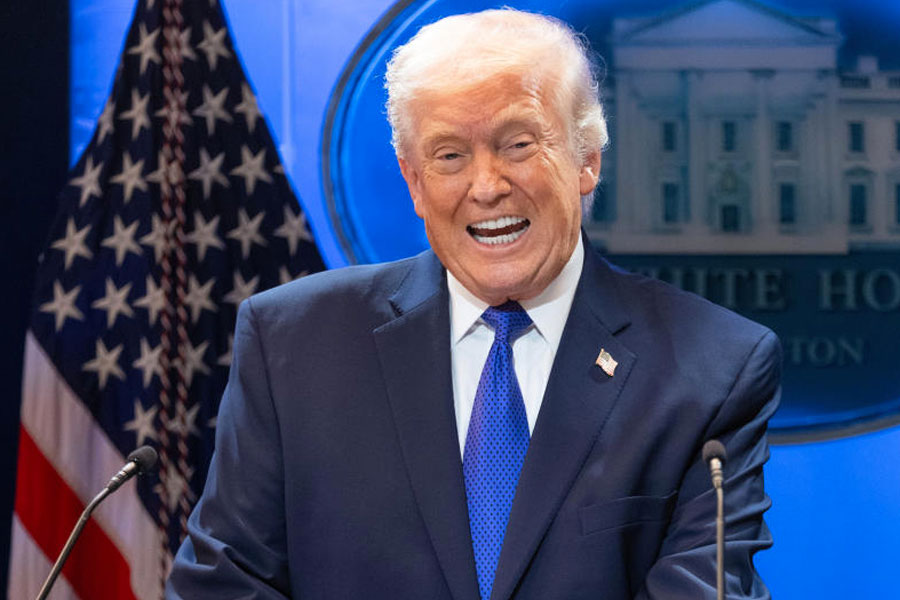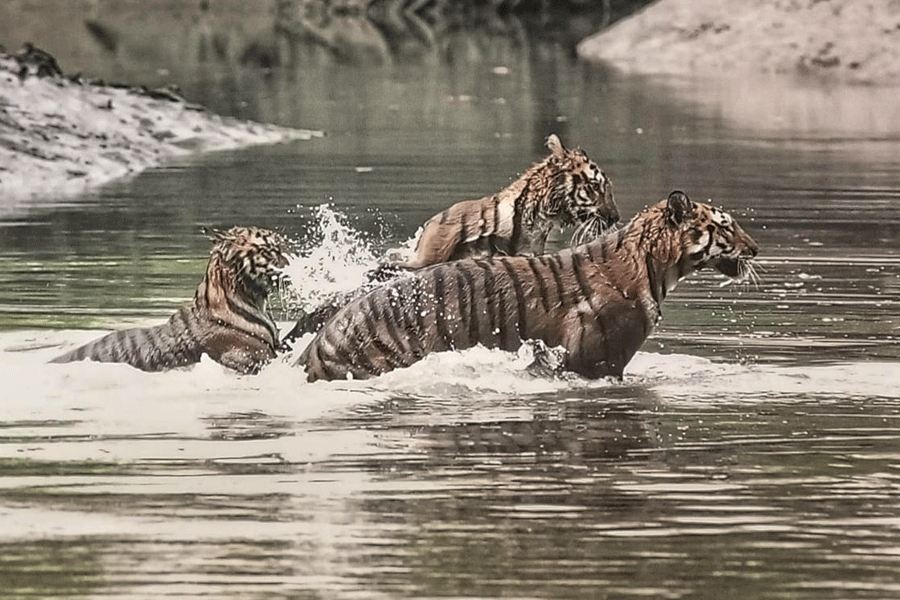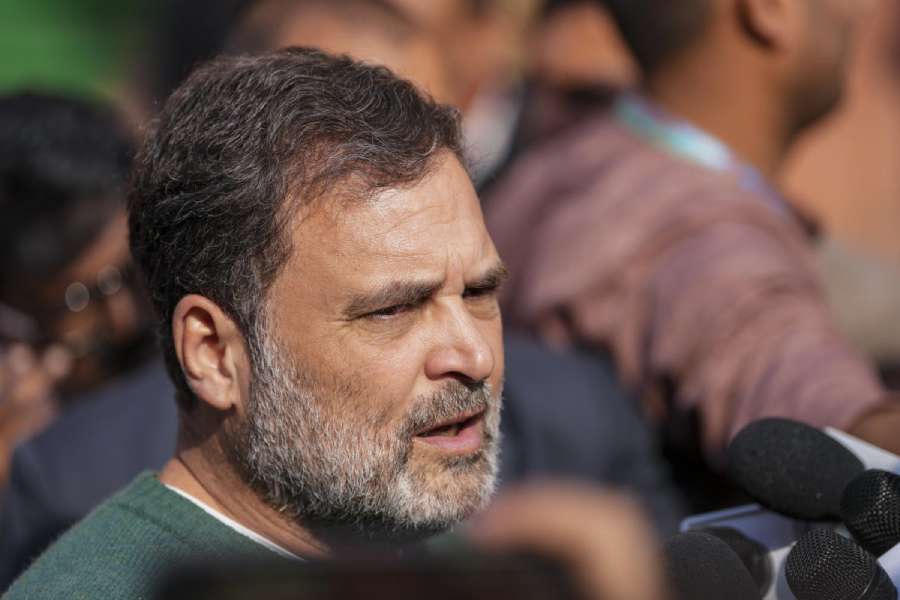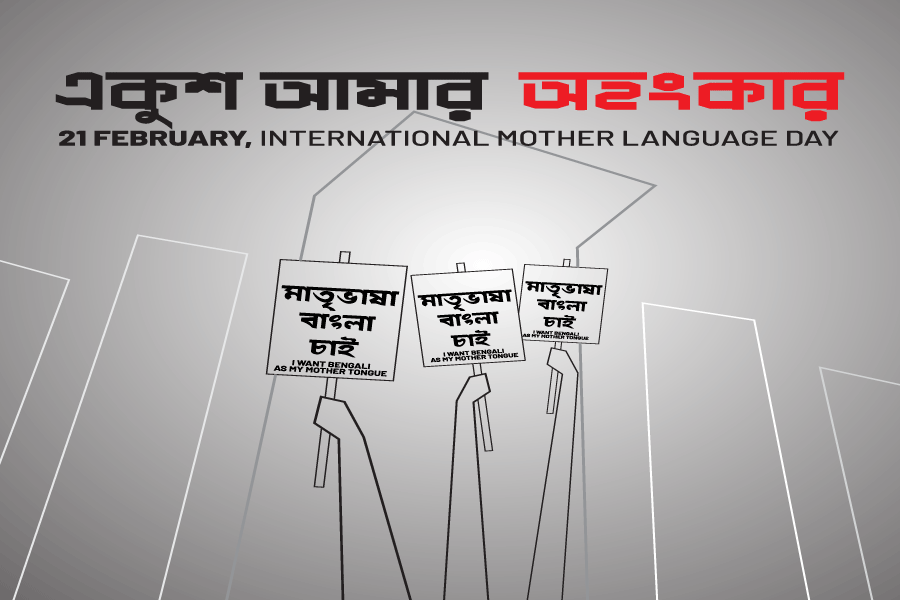.jpg)
I am a few minutes early for the interview. As I look around the spacious living room of the south Calcutta apartment while I wait, my gaze gets stuck on a photograph of Subhendu Chatterjee. It is a black-and-white frame, showing what is possibly the late actor's best profile. A half smile on his lips, he is looking at something in the distance.
Actor Saswata Chatterjee enters the room. It is a Sunday afternoon and he is dressed in T-shirt and track pants. I look from wall to man and the resemblance, though unmistakable, does not extend beyond form and features - at least that's how I perceive it. The father had a very pleasant screen presence, played the lead but more often the second lead. Saswata, on and off screen, has a much more definite persona - "too much character", some would say.
When he starts to talk, you realise he is a man of strong opinions. We get talking about Bengali films and I comment that barring one or two, most are incorrigible potboilers. Song, dance and spectacle in foreign settings, very little originality or regional flavour. Why can't we be like the South - teeming with great ideas, interesting scripts?
His response. "No one went to watch Kamaleshwar's [Mukherjee] Meghe Dhaka Tara, which I personally think is a classic. They said the topic put them off." I am not sure what this has to do with my question, but first I am trying to get the reference right, in my head. Meghe Dhaka Tara is based on the life of the legendary director Ritwik Ghatak. Saswata plays the central character.
In the meantime, he continues, "But when we took it to the Kerala Film Festival, the morning show at 8am played to a packed house, as did the show at 8.30pm. The audience down South is a hundred times more loyal to the industry."
And, I get my link.
There is perhaps a lack of originality in the film industry in Bengal? Saswata isn't willing to easily concede. "See, we have a director called Kaushik Ganguly. Each film of his revolves around a unique idea. Anjan da [Dutta] is making films based on Bengali literature. Srijit [Mukherji] has made a place for himself and Arindam Sil has been unexpectedly successful. I may have missed out a few names here, but they are all trying." The argument is neither here nor there, I start to point out, but he has already moved ahead in the conversation. He is now saying he agrees that most Bengali films today seem to lack something.
"Heart," he says and touches his own. Long, poignant pause. "Say, someone decides to release a movie during Durga Puja because more people watch movies then. You need a certain amount of time to come up with a script, right? Since you are in a hurry, you make a copy of a southern film."
And just in case you misunderstand, he clarifies, he has nothing against remakes, but a lot against poor quality remakes. "What we are getting is frame by frame lifts with the same sets, even the same colour scheme."
We break for tea. He likes his cuppa black, without sugar. We talk cabbages and kings. It is odd how his mobile phone never rings, doesn't disturb or disrupt as is the norm now. For the first time, he laughs. He doesn't use a mobile. "Only when I am on outdoor shoots to talk to my family."
I tell him when he smiles his resemblance to his father is more pronounced. He nods and says, "Everyone compares me to my father. And, of course, that is a comparison I can never win." It takes me a minute to understand he is talking about his initial days in the industry, the bitterness in his voice is so immediate. After a while, he stopped worrying about comparisons, buckled down and worked "with utmost concentration, 200 per cent honesty".
In Bengal, in the pre- Kahaani/Bob Biswas days, Saswata was known for playing Watson to Byomkesh Bakshi and Feluda alike.
Talking of (Satyajit) Ray's Feluda, wasn't he supposed to make his debut in a Ray film? That's correct. Ray did consider casting Saswata as the little boy in Joy Baba Felunath, the adventure of the missing Ganesh idol. "But my mother, sensing an offer, promptly took me to a salon and got me a bad hair cut. There was a huge row at home over this. Eventually, I did go to meet Ray at his home with Baba, but he was aghast." Ray could not wait for his hair to grow out and cast another youngster - Jit Bose - instead.
But this is not Chatterjee's favourite Ray. That goes thus: One time, the Rays and the Chatterjees were attending the wedding of a common friend. Saswata was still in school. Bijoya Ray called Saswata over and said to him, "Listen to what your jethu [father's elder brother] is saying." Ray told him he would make a very good Topshe, detective Felu Mitter's assistant and chronicler. "But when I asked him when that would be, he said - "Ki kore korbo? Santosh -i to nei... But it's not possible for me to make another Feluda film. Not without Santosh." Santosh Dutta, who played the character of Jatayu, a comic foil to the intense sleuth, had died and left a vacuum. A bitter-sweet note hovers in Saswata's voice. "I felt very bad. Why did he have to say it then? Why give me false hope?"
Years later, Ray's son Sandip cast Saswata as Topshe in his television series. It was the start of a long stint on TV. "People stopped casting me in films. 'No one will pay to come and watch a TV actor in a hall,' they said." Saswata mimics expertly. So he put his heart and soul into the work that came his way. And he was cast in an important role in the iconic Bengali mega serial, Ek Akasher Niche. This was 1999. "Ravi Ojha [the director] changed the whole concept of serials. It went on for five-and-a-half years, not a matter of joke," says the man who claims he doesn't really miss TV.
Mrinal Sen saw it and cast him in Amar Bhuvan (2002). The year after, he played his father's son in Abar Aranye, Gautam Ghose's sequel to Ray's Aranyer Din Ratri. Ravi Ojha made a film with him in the lead, but Abar Asibo Phire (2004) sank without a trace. There is no doubt that Saswata is a committed actor, a thinking director's actor, and he has courted success on his own terms. But it wasn't until Sujoy Ghosh cast him in Kahaani that he burst upon national consciousness.
When he accepted the character of Bob Biswas did he realise how popular it would become? "I was just as surprised as anyone else," laughs Saswata. Would he play a similar character again? He has been approached, he admits, but he isn't interested anymore. "Been there, done that," he shrugs.
Does he ever think of returning to TV? He does not have the time for it he says. "The serials go on and on, if I take up a role I wouldn't be able to leave. Besides, the hours are terrible. Not that he hasn't done it earlier, "but I was younger then". He complains about the fact that actors' names do not feature on the title scroll of serials. "Is the job they are doing that thankless?"
Saswata is more excited by a web series, Dhimaner Dinkal, he has recently done. "It is based on a character just like me, who doesn't use a cellphone."
And it's a wrap. So what is his comment, wish, hope, for the Bengali film industry? Our man is silent, thinking. If our films do not do well commercially then the producers are the ones to incur losses. Then why do they allow this to happen? Face impassive, he is still thinking. So it is a hopeless situation? Then he starts to talk. "You have to ask them. Nowadays many producers come into the industry without knowing a thing about the business. They don't even know how to get the show timings right."
Without going into specifics, he says, "I do not believe in monopoly. It is always harmful. If I have no one to compete with, why will I do my job well? The day healthy competition returns to Tollywood is the day the Bangla film industry will return to its days of glory."
tétevitae
1970: Saswata is born to physician-turned-actor Subhendu Chatterjee and his wife, Anjali
Never a keen student, he announces his decision to take up a career in acting after completing his NIIT diploma
His father launches him as an actor in his play, Baisakhi Jhor
Prior to this, worked with the theatre group, Charbak. Founder Jochhon Dastidar was his mentor
Credits comedian Rabi Ghosh for turning him into a television and film actor
Makes TV debut with Hindi serial Kalpurush, directed by Saibal Mitra based on a novel by Samaresh Majumdar
1999: After a series of telefilms, wherein he plays Topshe to Feluda, becomes a household name with the mega serial, Ek Aakasher Niche by Ravi Ojha
2012: Plays the ingratiating psycho killer, Bob Biswas, in the Vidya Balan-starrer, Kahaani
2015: His next Bollywood venture is Jagga Jasoos
Has just made his web series debut with Dhimaner Dinkal

.jpg)








